
You’re going through your life, being you, but then you see Michael Paré wearing a long trenchcoat, making out with a girl in the rain, backlit by neon, and then you just know that something is different now. It’s like a thought had been internalized within and you realize ‘Hey, this is me now’. For a lot of guys today, it’s Drive (2011), but for teenage weebs in the 90s, Neon Genesis Evangelion was that paradigm shift moment.
Amidst the endless memes surrounding Evangelion, it can be hard for people to recall a time when it was novel. There had always been dramatic mecha anime before it, but this one hit differently than anything else and managed to penetrate the zeitgeist in ways Patlabor and Macross didn’t.
Despite only being one season of 26 episodes, Evangelion has endured in ways much longer-running anime hasn’t. How did they do it? Does it hold up after all this time? Is it everything it is hyped up to be? Is the Collector’s Edition worth it? Which version is the best one?
NEON GENESIS EVANGELION Collector’s Edition
Production Company: Gainax, khara, Toei, Tatsunoko
Distributor: GKIDS, Shout Factory
Director: Hideaki Anno
Release Date: December 6, 2021
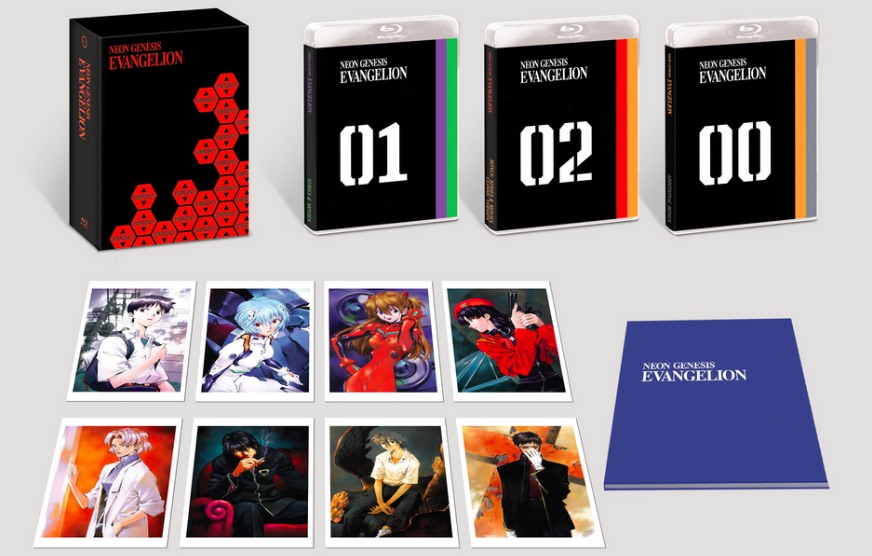
For such a groundbreaking and popular anime, Evangelion was not widely available for a while. There was a DVD that went out of print quickly and became absurdly costly and the Japanese Blu-rays did not have any English options included at all. GKIDS and Shout Factory have finally assembled the definitive viewing experience for all 26 episodes and the movie, The End of Evangelion.
The Collector’s Edition effectively comes with two sets of all the episodes and the movies. With the extras, the set is a total of eleven discs, divided into three numbered cases with distinct colors that represent their respective Eva Unit designations. Also included is a hefty episode guidebook full of art and designs, printed on glossy paper.
The stand-out inclusion is the eight art cards that are printed on heavy-duty matte cardstock. These are beautiful illustrations from Yoshiyuki Sadamoto, the artist who designed all the characters. His style is what can be best described as ‘quintessential’ anime. He has a very refined understanding of posing and composition, and his use of rich colors and shape make him one of the best in the medium.
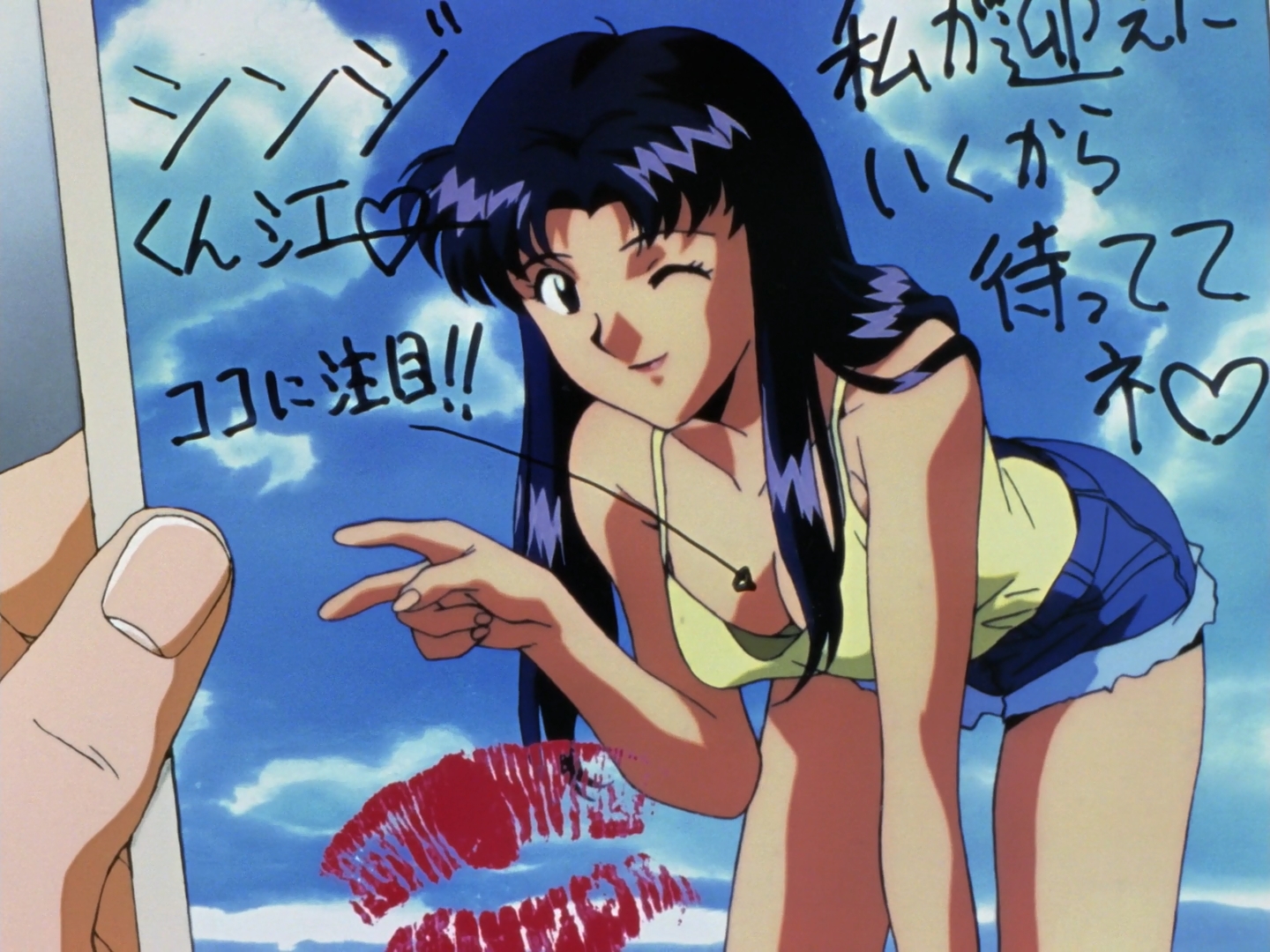
The packaging for this set feels sturdy and the plastic cases hold the discs securely. The black box with warning hexes is minimalistic and bold. It makes a statement when on a shelf, and when you squint, it kind of looks like the monolith from 2001: A Space Odyssey.
This set goes for $219.98, which is a tall order even for the most dedicated fans. For newcomers, this will be alienating, and may be better off with the standard edition which is around $39.99. Sadly, interested parties who opt for the standard edition will only have the Netflix dub as their English audio option.
The Netflix dub is almost unlistenable since the translation is very literal and characters don’t speak naturally. Fans who prefer subs won’t need to bother with this set at all, but for those who grew up watching Evangelion in the 90s in English, there is no other choice. The crew at ADV was right to punch up some dialogue where needed and took the necessary liberties to make lines flow more naturally.
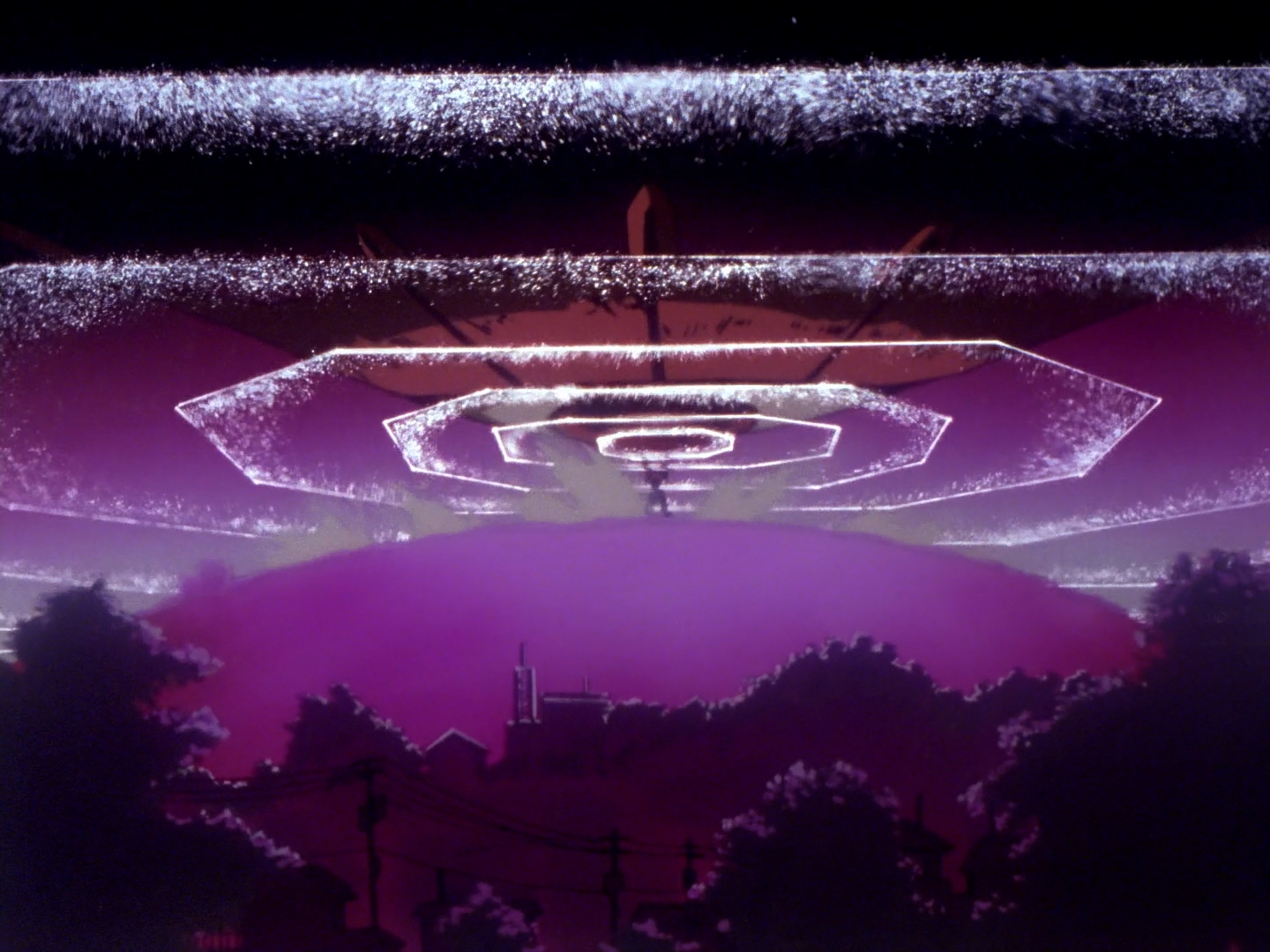
The reason why anyone would want this expensive set is because they would want Eva in HD and with the ADV dub, and because the Ultimate Edition is even more outrageously expensive. Only 5,000 copies of the Ultimate Edition were made and it already fetches prices around the $500 range online. Suddenly, $220 seems almost reasonable in comparison, especially since the differences are mainly a 156-page art book and packaging.
After you’ve felt the sting of buying an expensive box set of Evangelion and completely ignoring the discs with the Netflix dub, you’re ready to get started. Whether you grew up watching this or have been exposed to countless memes, fan art, and pop culture references, you begin and are smacked with one of the most iconic and memorable intros of all time.
A Cruel Angel’s Thesis has earned its memes for being unbelievably catchy and infectious. The visuals and editing of this song further elevate it and set the tone for what to expect. The memes that you aren’t supposed to skip the intro make sense, but sadly the outro regrettably lost the Fly Me To The Moon arrangement due to licensing. It has been replaced with Hostility Restrained, a piano piece from the show’s score.
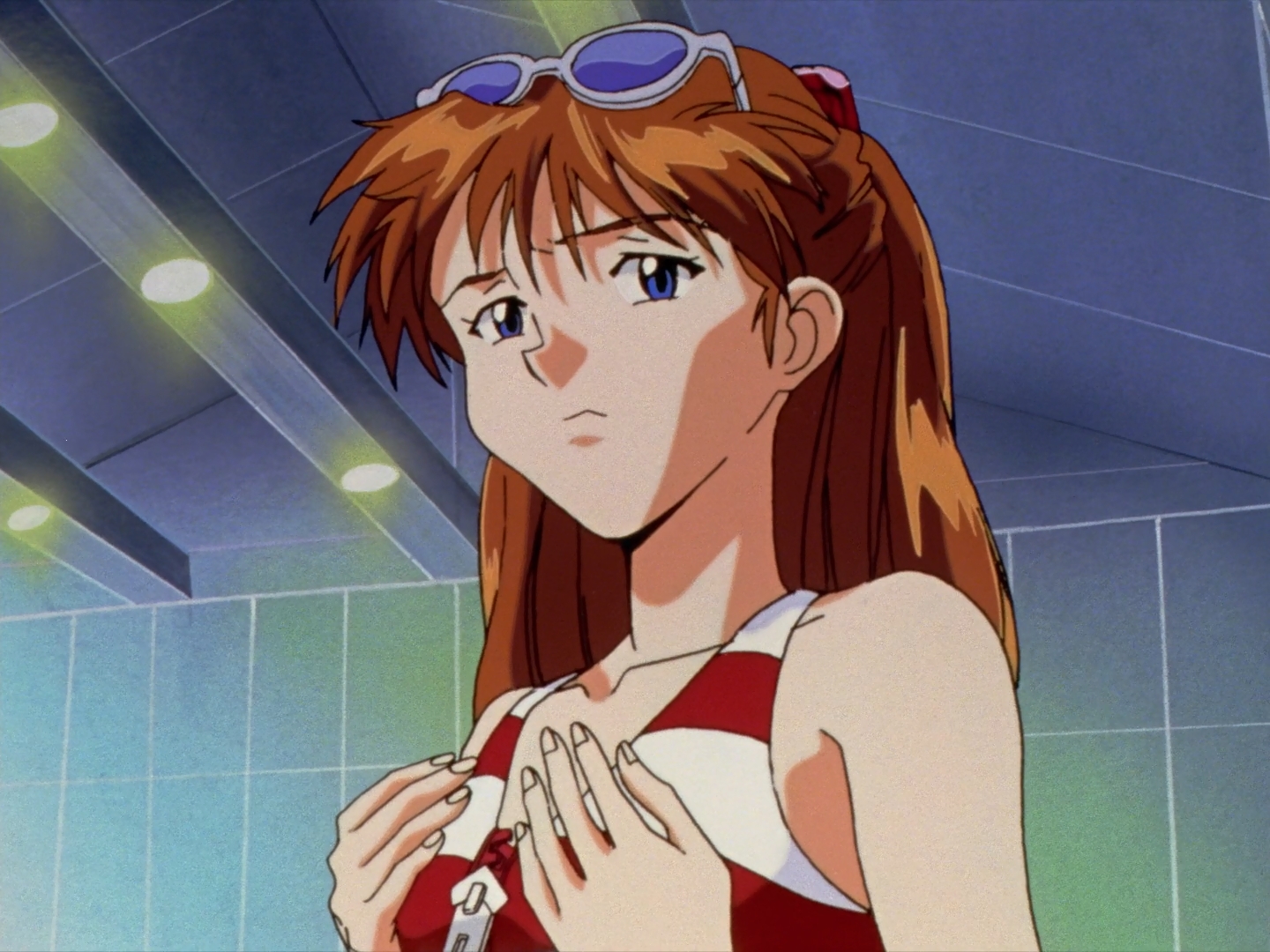
In the year 2015, set in the metropolis of Tokyo-3, Shinji Ikari has been summoned by his estranged father, the enigmatic commander of NERV, an organization dedicated to eradicating monstrous entities known as “Angels.” The only weapons capable of combating these behemoths are Evangelions, towering humanoid mecha piloted by specially chosen children, including Shinji, who is tasked with controlling the formidable EVA-01.
Shinji grapples with the weight of this daunting responsibility, he must also navigate the treacherous waters of adolescence, wrestling with his insecurities, anxieties, and a deep-seated yearning for acceptance. The world around him is a surreal amalgam of post-apocalyptic decay and liminal urban sprawl, reflecting the internal turmoil that grips Shinji’s crumbling psyche.
Shinji’s estrangement from his father forces him to move in with the sexy NERV officer Misato Katsuragi. On the surface, Misato seemed like she had her life together, but peel back the layers of her constructed facade and you’d find a woman drowning in a sea of self-destruction. An untidy alcoholic, Misato’s home is a graveyard of empty beer cans, her mornings starting with a swig of the golden elixir before she even bothered to put on fresh clothes.
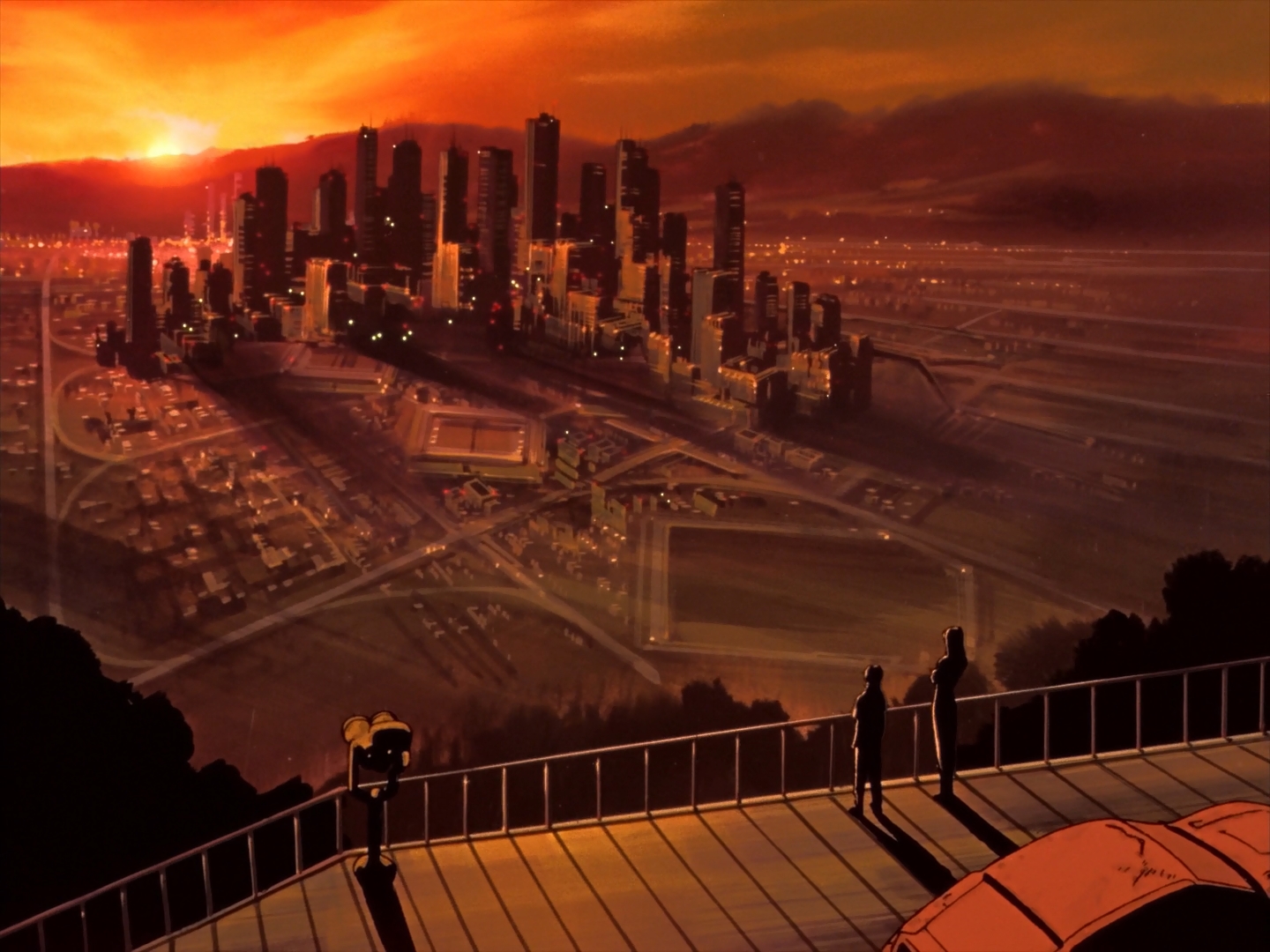
The NERV circus gets a whole lot more crowded when the spunky German-Japanese Asuka Langley Soryu shows up, bringing a whole lot of attitude and a whole lot of sass to the mix. Shinji’s life just got a whole lot more complicated, and he doesn’t even know where to begin. On top of Asuka’s constant putdowns and ridicule, there’s also Ryoji Kaji, a mysterious agent with a history with Misato, much to her chagrin.
Things get a lot more interesting with Asuka, as she effectively hijacks the anime. She doesn’t appear until the sixth episode, yet she is one of the most memorable and enjoyable characters in the show. She was one of the most defining examples of the ‘tsundere’ trope in anime, yet at the same time she is deconstructed the further the story unfolds and comes to its harrowing conclusion in The End of Evangelion.
Neon Genesis Evangelion could be another battle anime, but scratch beneath the surface, and you’ll find a whole world of clandestine operations, hidden agendas, and psychological warfare. As the series progresses, the cracks in Shinji and Asuka’s psyche start to show, and the enigmatic Rei’s creepy relationship with Gendo takes a turn toward the disturbing. This is one anime that doesn’t shy away from the dark underbelly of human nature.
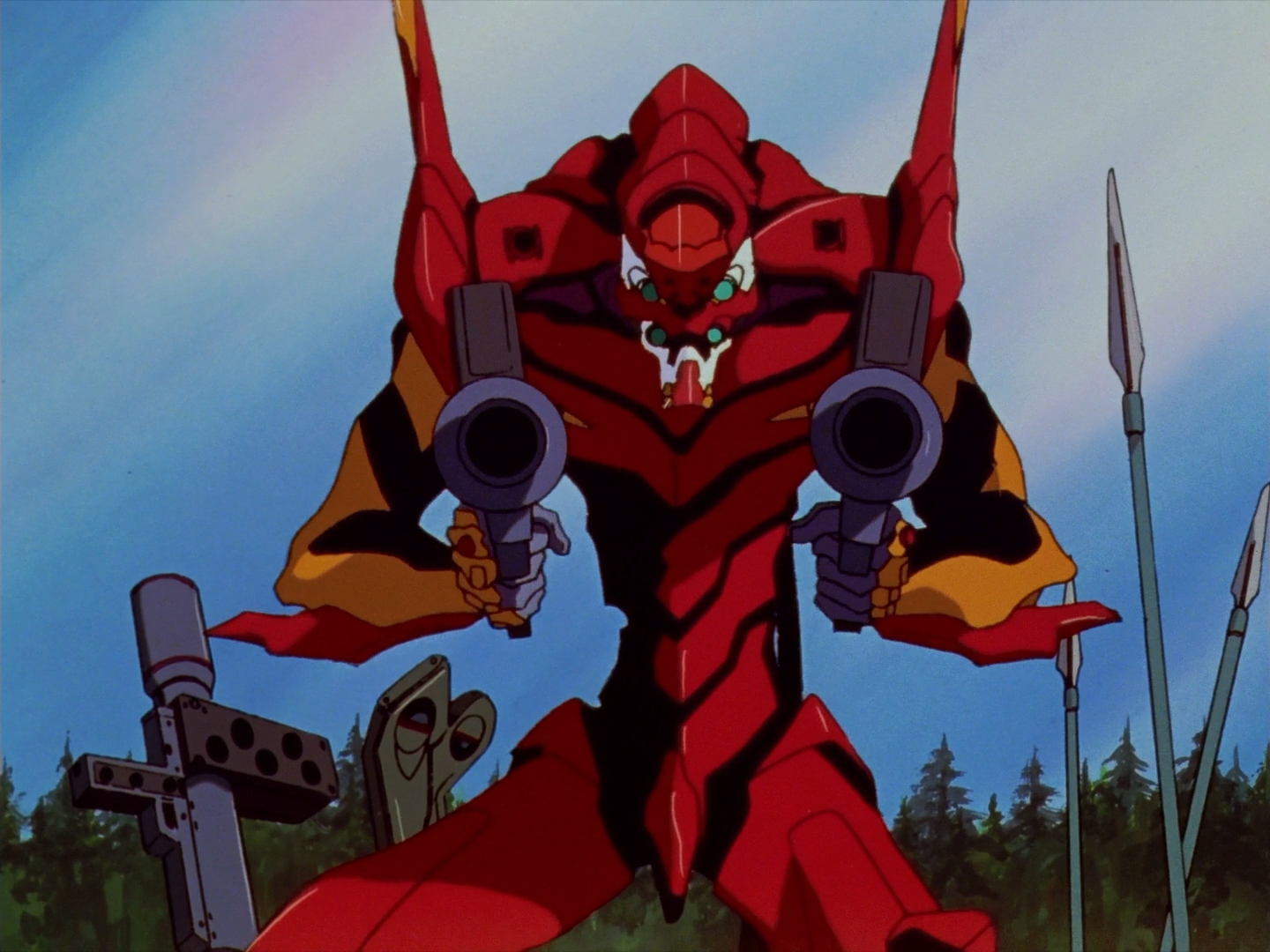
Evangelion‘s psychological themes are all the more gripping when combined with the animation. Director and writer Hideaki Anno uses a dizzying array of techniques to suck the viewer into the story. In some sequences, standard animation takes a backseat, often replaced by pencil drawings, felt-tip art, and a heavy barrage of montages.
Anno goes even further, incorporating live-action footage into the mix for a truly immersive experience. It’s as if he is determined to break down the barriers between the viewer and the characters, forcing us to confront their inner demons alongside them.
The animation becomes a reflection of their tortured psyches, a way to express the raw, unfiltered emotions that are bubbling just beneath the surface. It’s a bold and daring approach, and it pays off big time. Anno’s direction is nothing short of mesmerizing, and it’s a crucial part of what makes Evangelion such a special and unforgettable experience.
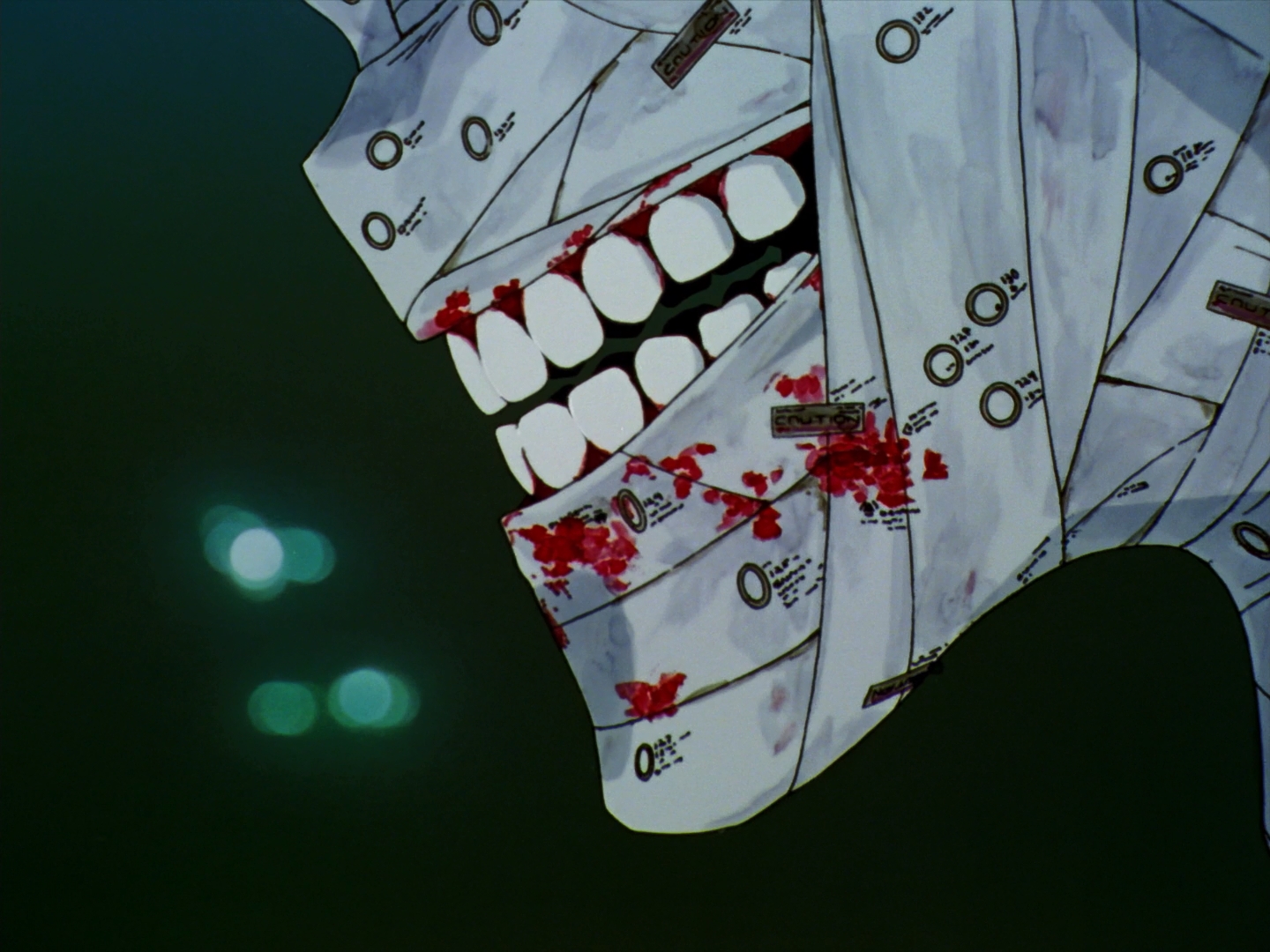
Evangelion is a labyrinth of complexity, a tangled web of battles, psychology, and obscure religious references that would make Dante himself scratch his head. The Dead Sea Scrolls have nothing on this show’s cryptic symbolism and hidden meanings. It’s a puzzle that’s almost impossible to solve, a Gordian knot of narrative intricacy that leaves you scratching your head and wondering if you’ve just been smoking some of Rei’s special “LCL” juice.
The show’s ending is so mind-boggling, so utterly baffling, that it left viewers so incensed that they (probably) stormed the Gainax studio, pitchforks and torches in hand. It was an ending that made David Lynch’s movies look like straightforward plotlines.
Evangelion is a show that doesn’t spoon-feed you its meaning. It doesn’t hold your hand and guide you through its labyrinthine narrative. It throws you into the deep end and expects you to swim or sink… and that’s why it’s so brilliant. It’s a show that demands your attention, challenges you, and ultimately rewards you with an experience that is both exhilarating and thought-provoking at the expense of a traditional narrative.
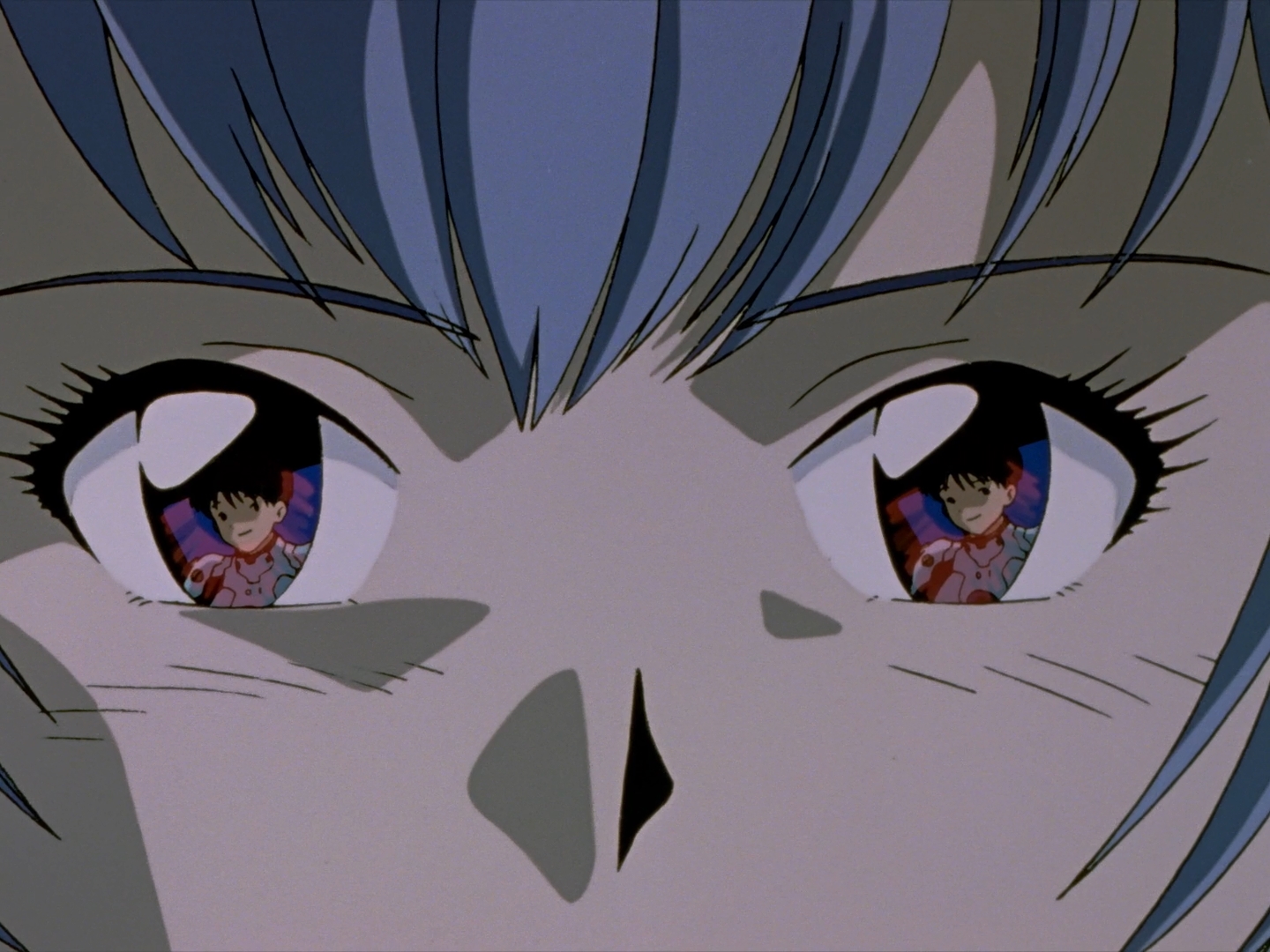
In a desperate attempt to salvage the wreckage that was the original TV ending, the boys at Gainax went back to the drawing board, crafting two films that would hopefully set things right. The first, Death (True)2, was a re-edit of the previously released Death & Rebirth, a compilation film that had left many viewers scratching their heads in utter befuddlement.
The End of Evangelion, a reimagining of the last two episodes of the TV series, truly blew the doors wide open. This was Evangelion unleashed, unhinged, and unfiltered. The violence was more intense, the symbolism more overt, and the ending far more decisive. It was a gut-punch of an ending, a cinematic Molotov cocktail that left viewers reeling and critics salivating.
Evangelion had finally found its voice, its true raison d’être. The films were raw, visceral, and unapologetically honest, a reflection of the show’s creator, Hideaki Anno, and his own personal struggles. They were a middle finger to convention, a rejection of the status quo, and a testament to the power of art to shock, disturb, and ultimately, heal.
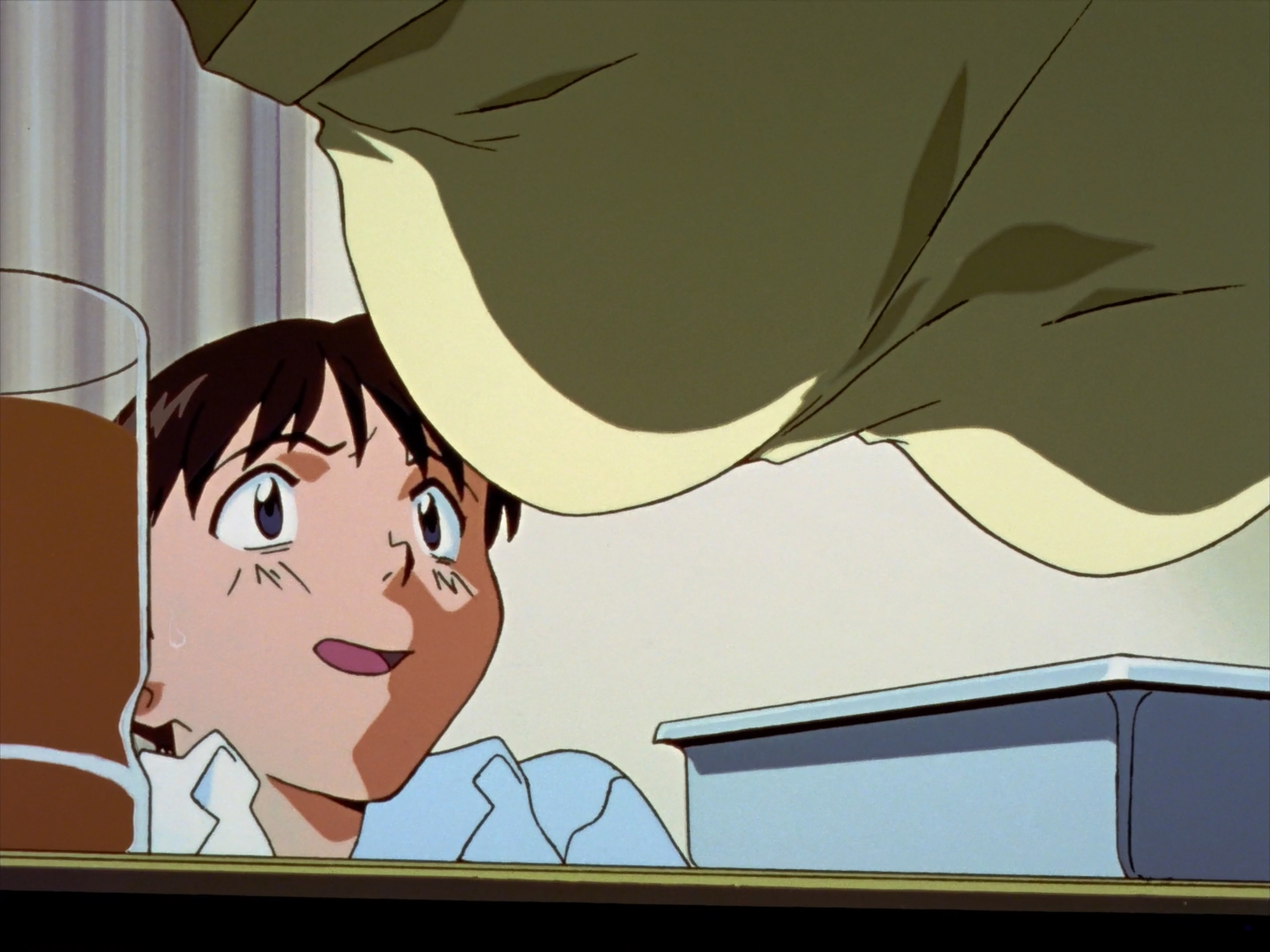
Another reason why Evangelion is so memorable is how flawed it is. Not every episode is a winner and the story can get bogged down in some overly melodramatic scenes that make the viewing experience feel downright depressing. It can also be easy to dismiss most of Anno’s style as pretentious with its intensely bleak and cynical climax.
Evangelion was a revolution, a nuclear explosion for TV anime. It took the mecha genre and turned it inside out, shaking it to its very core and leaving it forever changed. Before Evangelion, TV anime was mostly a playground for kiddie shows and manga adaptations, with a few outliers daring to push the boundaries of storytelling.
Evangelion was different. It was a show that didn’t care about conventions or expectations. It was raw, visceral, and unapologetically honest. It proved that anime could be mature, complex, and thought-provoking, paving the way for a new generation of anime creators, who were now free to explore more mature and challenging themes.
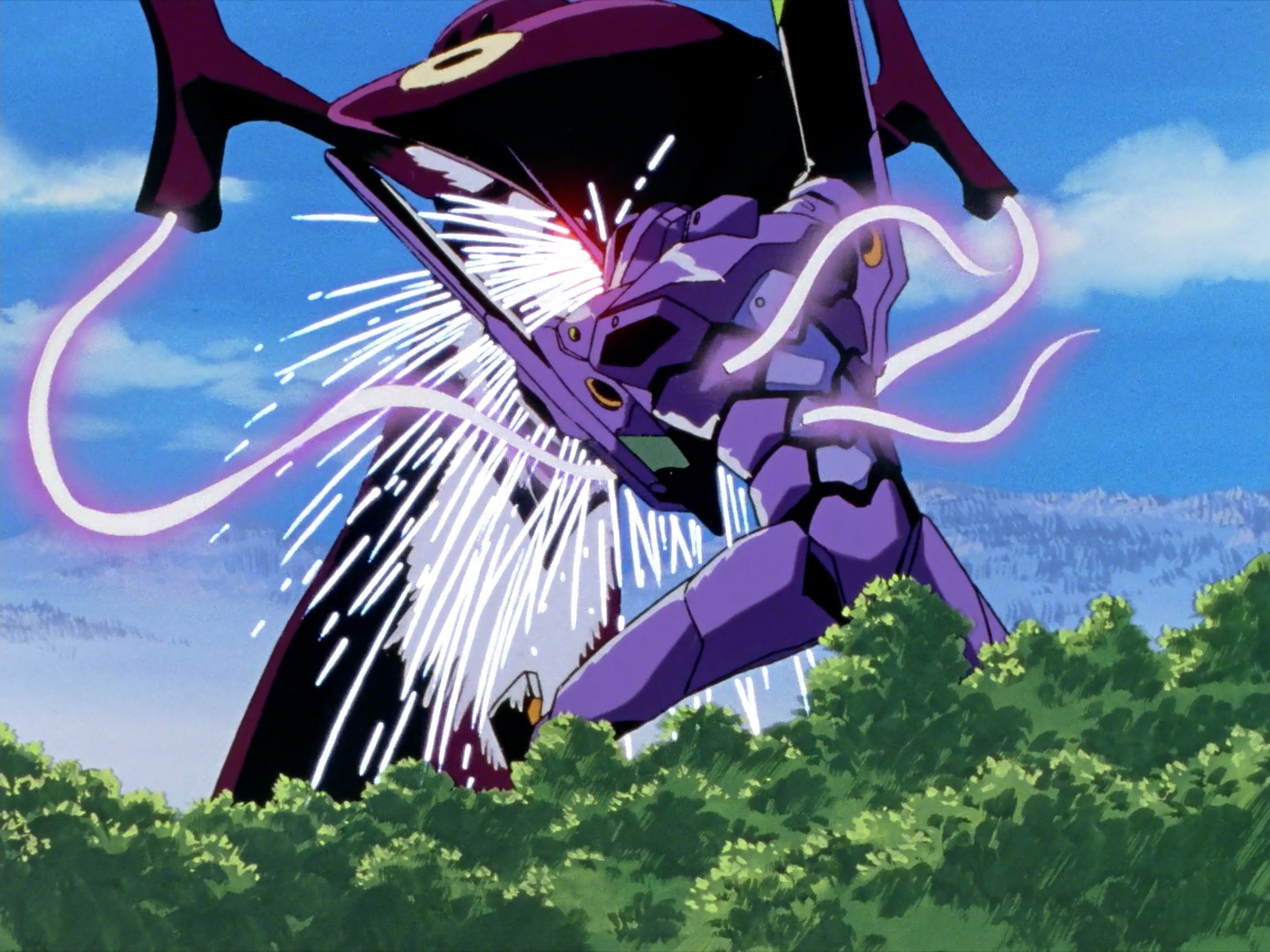
Hold onto your eyeballs because Neon Genesis Evangelion is presented in a mind-blowing 1080p MPEG-4 AVC encoded high definition, so sharp it could slice through your retinas. The original broadcast aspect ratio of 1.33:1 full frame is preserved, capturing every minute detail. The theatrical features are a widescreen 1.78:1 aspect ratio.
Your retinas will be pleasured by a kaleidoscope of pronounced colors with an intensity that could rival a nuclear explosion. The animation comes to life with a vivid splendor where the handcrafted details in the animation cels are more defined in crystal clarity.
The presentation has a depth that makes you feel like you’re right there in the thick of the action, dodging Angels and piloting Evas like a pro. DNR (digital noise reduction) is restrained here, ensuring that there is some fine grain throughout. Sadly, episode 16’s negatives were lost and it was upscaled from standard definition. It is still better looking than some releases, but it stands out in this set.
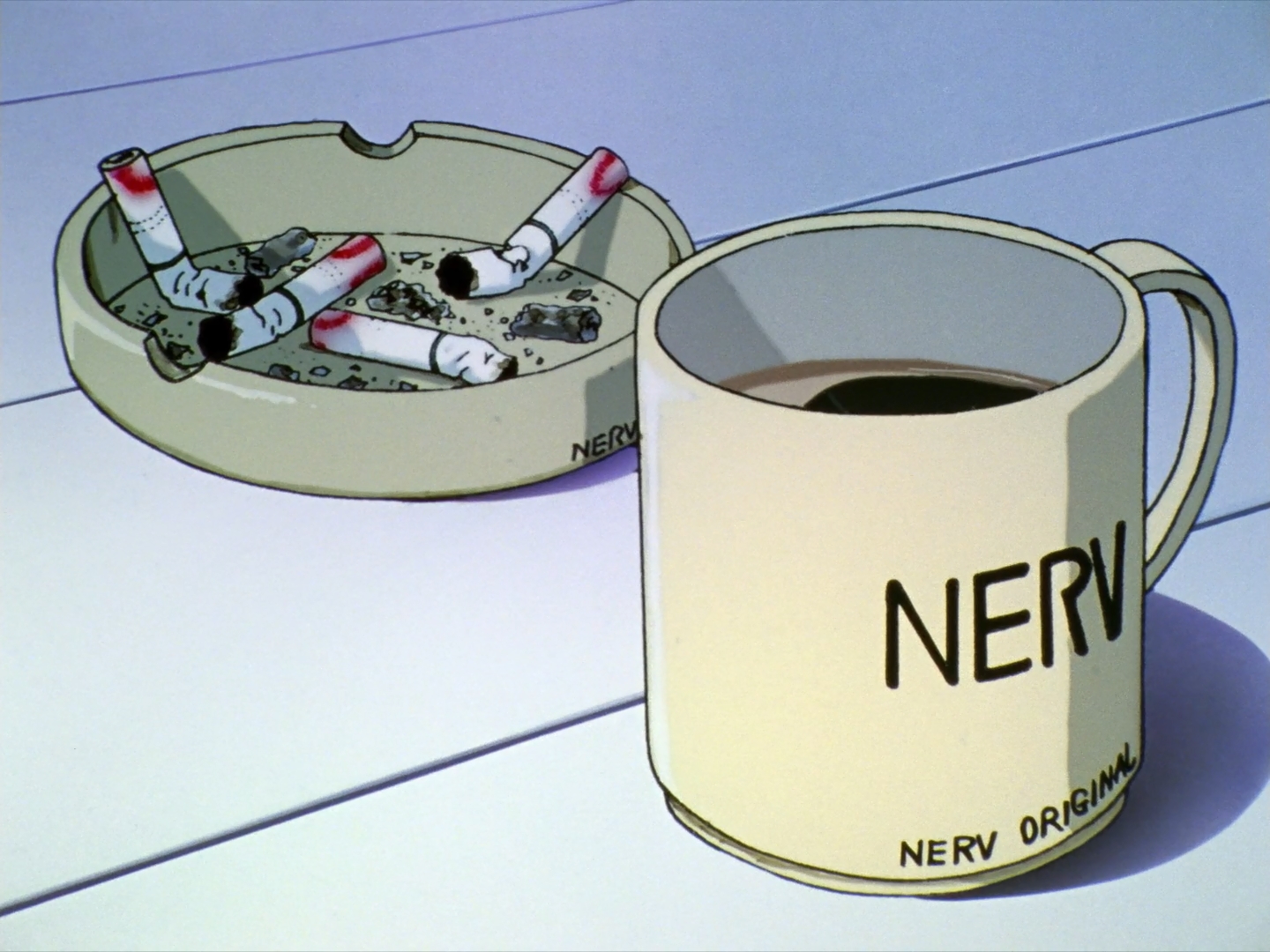
Prepare to have your ears blown off by lossless audio, including English DTS-HD Master Audio 5.1 and 2.0, and Japanese DTS-HD Master Audio 5.1 and 2.0. Whether you’re a purist who prefers the original Japanese dub or a fan of the ADV dub, you’re covered.
A special mention must be given to the ADV voice actors who brought the characters to life. Shinji Ikari’s voice actor, Spike Spencer, delivers a performance that’s both vulnerable and strong, perfectly capturing the character’s complex inner turmoil. Allison Keith as Misato sounds tough even when she’s at her weakest. Her voice is very unique and she injects a lot of sexiness into the role.
Tiffany Grant as Asuka is the main event. She’s like the Jimi Hendrix of voice actors, a sonic sorceress who can conjure up emotions with her voice that’ll make you laugh, cry, and everything in between. Asuka is a complex character, a whirlwind of contradictions who’s both strong and vulnerable, confident and insecure. Grant captures all of these nuances with a precision that’s nothing short of enthralling.
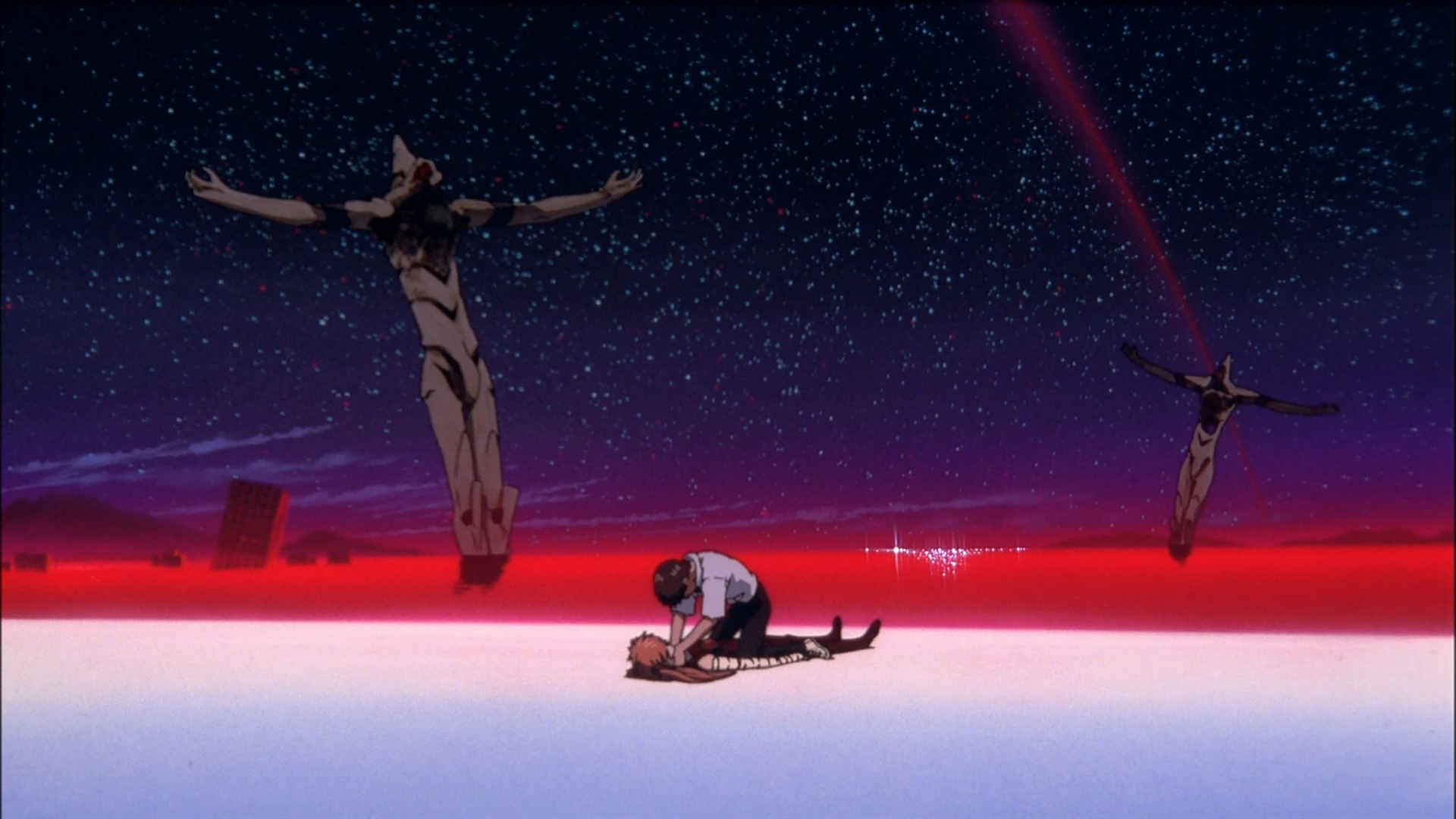
One minute, she’s the cocky, arrogant Red Baron, strutting around like she owns the world. The next, she’s a broken little girl, crying out for attention and affection. Grant transitions between these extremes seamlessly, making Asuka one of the most compelling and relatable characters in all of anime. Peppering German into her dialogue was a stroke of genius that gives the character a ton of flavor.
Evangelion was a show that wasn’t afraid to get dark, to explore the depths of human despair and the darkest corners of the psyche. It was a show that made you question everything you thought you knew about anime, about storytelling, and about life itself.
Evangelion became a cultural phenomenon, spawning a massive fan base and inspiring countless imitators. It changed the face of anime, and it continues to be a source of inspiration and debate to this day.
NEON GENESIS EVANGELION Collector’s Edition was reviewed with a Bluray purchased by Niche Gamer. You can find additional information about Niche Gamer’s review/ethics policy here. NEON GENESIS EVANGELION Collector’s Edition is now available on Bluray via Shout Factory.